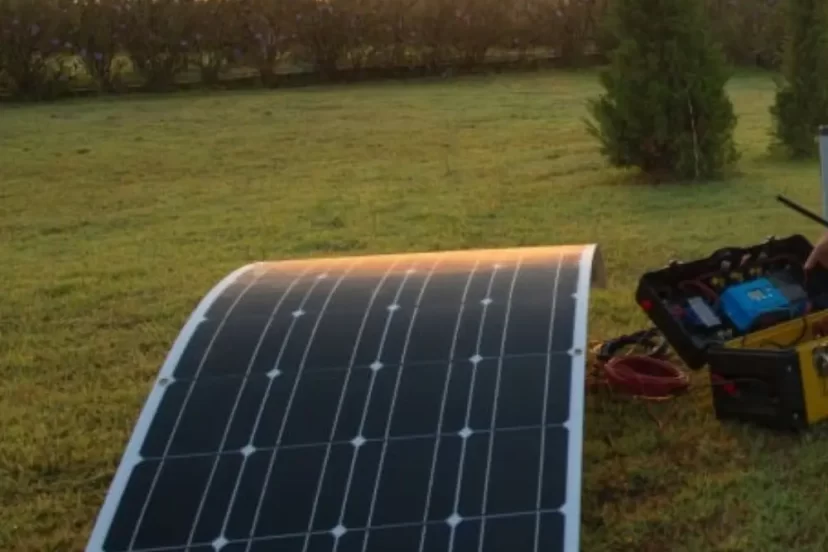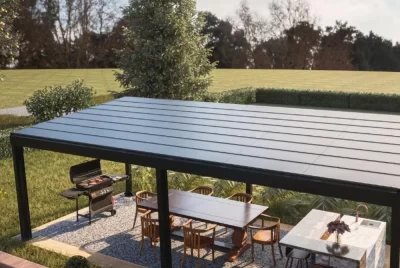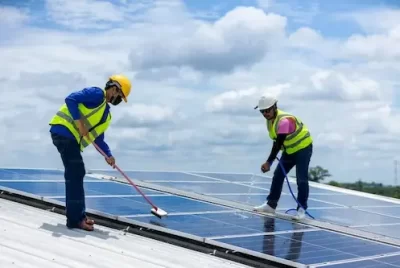Flexible Solar Panels: Leading the Way Into The Future
We may earn a commission for purchases made using our links. See our disclosure to learn more.
These innovative solar panels have revolutionized the way we harness solar energy by providing flexibility, portability, and versatility. In this article, I will delve into the advantages of these solar panels, discuss the different types available, provide insights into the factors to consider when choosing them, explore their various applications, and offer valuable suggestions to help you make informed decisions.
Advantages of Flexible Solar Panels
• Lightweight and Portable: These solar panels are incredibly lightweight and can be easily transported and installed in various settings. Their flexible nature allows for easy integration with curved surfaces, making them ideal for applications where rigid solar panels are impractical.
• Versatile Installation Options: One of the major advantages of these solar panels is their versatility in installation. They can be mounted on various surfaces such as roofs, tents, boats, and even backpacks, providing energy generation options wherever you go.
• Durability and Resistance: Flexible solar panels are designed to withstand harsh weather conditions, including strong winds and impact. Their rugged construction and resistance to vibrations make them suitable for outdoor activities and environments.
• Aesthetically Pleasing: Unlike traditional solar panels, these solar panels have a sleek and low-profile design that blends seamlessly with different structures. They offer a visually appealing option for those who value aesthetics.
Types of Flexible Solar Panels
Flexible solar panels are available in different types, each with its own unique characteristics and advantages. Let’s explore three popular types:
• Monocrystalline Flexible Solar Panels: These panels are made from a single crystal structure, resulting in higher efficiency and power output. They perform exceptionally well in direct sunlight and are an excellent choice for applications that require maximum power generation.
• Polycrystalline Flexible Solar Panels: Polycrystalline solar panels are made from multiple crystal structures, offering a cost-effective solution with good overall efficiency. They are slightly less efficient than monocrystalline panels but are still highly reliable and perform well in various lighting conditions.
• Thin-Film Flexible Solar Panels: Thin-film solar panels are manufactured using a deposition process that applies a thin layer of photovoltaic material onto a flexible substrate. They are lightweight, flexible, and
offer excellent performance in low-light conditions. While they may have lower efficiency compared to crystalline panels, they excel in applications where weight and flexibility are paramount.
Factors to Consider When Choosing Flexible Solar Panels
When selecting these solar panels, it’s important to consider the following factors to ensure you choose the right option for your specific needs:
• Power Output and Efficiency: Evaluate the power output and efficiency of the panels to determine how much energy they can generate in different lighting conditions. Look for panels with higher efficiency ratings for optimal performance.
• Size and Flexibility: Consider the size and flexibility of the panels, especially if you have specific installation requirements. Flexible panels can conform to curved surfaces, allowing for easier integration in various settings.
• Durability and Weather Resistance: Look for panels that are built to withstand outdoor conditions, including extreme temperatures, moisture, and UV exposure. Opt for panels with durable materials and protective coatings to ensure long-lasting performance.
• Cost and Warranty: Compare the cost of different flexible solar panels and consider the warranty provided by the manufacturer. It’s essential to find a balance between cost and quality to ensure you’re investing in a reliable and durable product.
• Installation and Maintenance: Evaluate the installation process and determine if you can handle it yourself or if professional assistance is required. Additionally, consider the maintenance requirements of the panels and ensure they align with your capabilities and preferences.
Applications of Flexible Solar Panels
Flexible solar panels offer a wide range of applications, making them a versatile choice for various scenarios. Here are some popular uses:
• Outdoor Recreational Activities: Flexible solar panels can power your outdoor adventures by providing energy for camping trips, hiking expeditions, and other recreational activities. They can charge your devices, run portable refrigerators, and keep your lights on in remote locations.
• Marine and RV Applications: Boats and RVs can greatly benefit from the flexibility of solar panels. They can be easily installed on the curved surfaces of boats and RV roofs, enabling a reliable source of power for navigation systems, appliances, and lighting.
• Backpacking and Hiking: Lightweight and portable panels are an excellent addition to your backpacking gear. They allow you to recharge your devices on the go, reducing the reliance on traditional power sources.
• Emergency Power Generation: During emergencies or power outages, these panels can provide a reliable source of electricity. They can keep essential devices running, such as communication devices, medical equipment, and emergency lights.
• Integration with Building Materials: As these solar panels continue to evolve, they are increasingly being integrated into building materials such as rooftops and facades. This seamless integration allows for aesthetically pleasing structures that generate clean energy.
• Portable Electronic Devices: These solar panels are available in smaller sizes, making them suitable for charging portable electronic devices like smartphones, tablets, and smartwatches. They provide a convenient and eco-friendly way to power your devices on the go.
Conclusion
Flexible solar panels offer a flexible, portable, and efficient solution for harnessing solar energy. With their lightweight design, versatility in installation, and durability, they have opened up new possibilities for energy generation in various applications. By considering factors such as power output, size, durability, and cost, you can make an informed decision when choosing these solar panels that align with your specific needs.
Incorporating these solar panels into outdoor activities, marine and RV applications, backpacking, emergency power generation, building integration, and portable electronic devices can enhance energy efficiency and provide a reliable source of clean energy.
Harness the power of the sun with flexible solar panels and embrace a sustainable and eco-friendly energy solution for a brighter future.
Check out Flexible Solar Panels on Amazon.
FAQ
Q: How long do flexible solar panels last?
These solar panels have a typical lifespan of approximately 10 to 25 years, depending on the quality of the panels and the maintenance provided. It’s important to choose panels from reputable manufacturers and follow proper care and maintenance guidelines to ensure longevity.
Q: Can flexible solar panels be used in cold climates?
Yes, these solar panels can be used in cold climates. They are designed to withstand a wide range of temperatures, including freezing conditions. However, it’s important to note that extreme cold temperatures may affect the efficiency of the panels temporarily. Snow and ice should be cleared from the panels to ensure optimal performance.
Q: Can I walk on flexible solar panels?
While these solar panels are durable and can withstand some weight, it is generally not recommended to walk directly on them. Excessive pressure or sharp objects can damage the delicate solar cells. If maintenance or cleaning is required, it’s best to consult the manufacturer’s guidelines or seek professional assistance.
Q: Are flexible solar panels waterproof?
These solar panels are designed to be weather-resistant and can withstand exposure to rain and moisture. They are typically sealed to prevent water damage. However, it’s important to ensure proper installation and maintenance to maintain the waterproof integrity of the panels.
Q: How do I clean flexible solar panels?
Cleaning these solar panels is relatively simple. Use a soft cloth or sponge and a mild soap solution to gently clean the surface of the panels. Avoid using abrasive materials or harsh chemicals that can damage the protective coatings. Regular cleaning helps maintain optimal efficiency by removing dirt, dust, and debris that can obstruct sunlight absorption.
Q: Are flexible solar panels suitable for residential applications?
These solar panels are more commonly used in portable or specialized applications, such as outdoor recreational activities and marine applications. While they can be integrated into building materials, traditional rigid solar panels are still more commonly used for residential installations due to their higher power output and efficiency. However, as technology advances, the use of these solar panels in residential settings may increase in the future.
Q: Are flexible solar panels less efficient than traditional rigid solar panels?
They generally have lower efficiency compared to traditional rigid solar panels. The flexible nature of these panels requires trade-offs in terms of materials and design, which can impact their overall efficiency. However, it’s important to consider the specific application and requirements. These solar panels excel in situations where portability, lightweight design, and curved surface integration are essential, even if their efficiency may be slightly lower.
Q: Can flexible solar panels be used in grid-tied systems?
Yes, they can be used in grid-tied systems. They can be connected to the electrical grid to feed excess power back into the system, reducing the reliance on traditional energy sources and potentially earning credits or incentives through net metering programs. It’s important to consult with a professional installer to ensure proper integration and compliance with local regulations.
Q: Can flexible solar panels be damaged by hail or strong winds?
These solar panels are designed to be durable and resistant to various weather conditions, including hail and strong winds. However, their resistance may vary depending on the specific brand and construction. High-quality flexible solar panels are built to withstand impact and have protective layers to minimize damage. It’s recommended to choose panels with appropriate certifications and ratings for hail and wind resistance, especially if you live in an area prone to severe weather.
With their flexibility, durability, and expanding range of applications, these solar panels offer exciting opportunities to harness solar energy in innovative ways. Consider your specific needs, weigh the advantages and limitations, and choose the right flexible solar panels to meet your energy requirements while enjoying the benefits of sustainability and independence.




